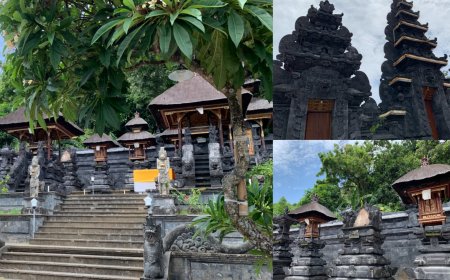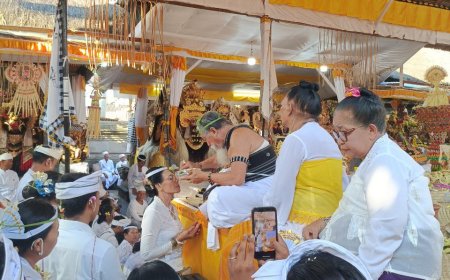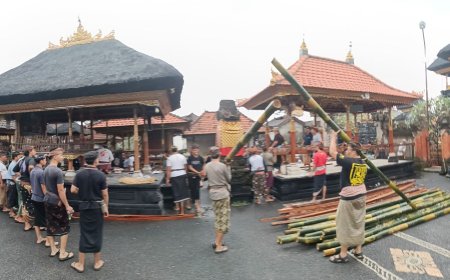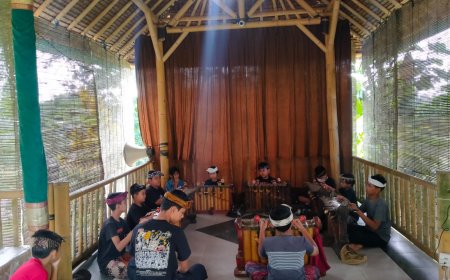Bamboo Family Cultural Heritage: Mundeh Village's Unique Crafts Driving Local Economy
Local wisdom in utilizing natural resources such as bamboo can be a driver of sustainable creative economy. As demonstrated by Mundeh Village, bamboo crafts not only preserve culture but also create economic opportunities for the community. Product innovations aligned with market trends, such as eco-friendly utensils and Instagrammable decorations, are key to its success. This empowerment model can inspire other villages to build tourism that directly impacts residents' welfare.

Modern tourism no longer solely emphasizes recreational aspects, but also experience, learning, and sustainability. Modern tourists are increasingly interested in destinations that offer closeness to nature, local cultural values, and opportunities to directly participate in community activities. Amid this trend, villages with natural wealth and handicraft traditions are beginning to be seen as promising alternative tourism destinations.
One of the great potentials in developing manufactured tourism lies in community creativity in utilizing natural resources available around them. Bamboo and coconut, two natural materials that grow abundantly in various rural areas, are real examples of wealth that can be processed into various products of economic, cultural, and aesthetic value. Bamboo is a renewable natural resource that grows abundantly in Mundeh village, has high economic value, and is culturally very attached to the life of Balinese people.

Process of making bamboo crafts by local artisans (Source: Personal Collection)
With a touch of innovation and education-based approach, these two materials not only create new business opportunities, but are also able to strengthen the village's image as a sustainable and environmentally friendly tourism area. Based on interviews with local craft business operators together with Mr. Dendy as a resource person who works in the field of processed coconut and bamboo crafts at BambooFamily_Mundeh, as well as field observations conducted by KKN students, it was found that bamboo and coconut can be the main foundation in developing manufactured tourism that prioritizes the principles of empowerment, sustainability, and cultural preservation.
In general, bamboo can be processed into two main types of products: functional products and decorative products that have high selling value in the tourism market. The following are some superior products that have been developed by the Mundeh Village community:

Traditional bamboo craft making process in Mundeh Village (Source: Personal Collection)
Woven Bamboo Baskets Considering the abundance of harvests in the Mundeh Village area, baskets made from bamboo can be used to meet the needs of local farmers to carry their harvests to market. In the tourism context, this basket becomes a medium that reflects the agrarian lifestyle of Balinese people and can be used as a traditional souvenir product for tourists visiting Mundeh Village. Its added value increases when traditional design and coloring are combined with modern functions, such as environmentally friendly shopping baskets.

Bamboo Spoons and Eating Utensils (Source: Personal Collection)
Bamboo products strongly support plastic reduction programs (zero plastic initiative) and are part of the "plastic-free village" movement. Bamboo can be developed into food containers, coasters, and other household furniture. Bamboo spoons become environmentally friendly eating utensil alternatives that can be sold in cafes or village souvenir centers. Empowering local residents to produce these products on an MSME scale opens sustainable economic opportunities for the community.
Environmentally friendly bamboo eating utensil products from Mundeh Village
Road Markers and Aesthetic Elements (Bamboo Markers)
Bamboo can function in tourism infrastructure development. Bamboo road markers function not only as location or tourism route indicators, but also as aesthetic elements that blend with the village's natural landscape. This concept can be developed in thematic tourism villages, where tourist routes, jogging tracks, and photo spots are equipped with bamboo markers that provide educational information or local cultural quotes.
Decorations and Art Installations from Bamboo
Community creativity is directed to create art installations made of bamboo such as gates, miniature buildings, photo spots, or garden decorations. Such decorations increase the visual appeal of tourism areas and become Instagrammable attractions sought by young generation tourists.
Economic and Social Impact
The development of the bamboo craft industry in Mundeh Village has had a significant positive impact on the local community's economy. Through empowerment programs carried out by BambooFamily_Mundeh, a number of heads of families now have additional income from weaving activities and making bamboo crafts. The skills training provided covers not only processing techniques, but also small business management and digital marketing.
The existence of this craft industry also strengthens local cultural identity. Traditional weaving techniques passed down through generations now receive wider appreciation from domestic and foreign tourists. This encourages the younger generation to continue preserving cultural heritage while developing it according to modern market needs.

Collection of Mundeh Village bamboo craft products before being processed into satay skewers with various motifs (Source: Personal Collection)
The cultural heritage of bamboo crafts in Mundeh Village has proven that local wisdom can be a driving force for the community's economy. With the right approach, abundant natural resources can be processed into high-value products that not only provide economic benefits, but also preserve culture and the environment. BambooFamily_Mundeh as a pioneer of the bamboo craft industry in this village has paved the way for sustainable creative economy development and is expected to become an inspiration for other villages in Bali.






























































